On September 24, 2022, the third "Dual-North Forum" and the academic seminar "The Trend of Major-Country Relations in the Context of International Crisis: Challenges and Responses", co-sponsored by the School of Politics and International Relations of Lanzhou University and the School of Administration of Jilin University, was held online. From Jilin University, Lanzhou University, Tongji University, Fudan University, Beijing Foreign Studies University, Chinese Academy of Social Sciences, Guangdong University of Foreign Studies, Beijing International Studies University, Tianjin Foreign Studies University, Shandong University, East China Normal University, Shanghai Institute for International Studies, Party School of the CPC Central Committee, Xi 'an Jiaotong University, Dalian University of Technology, the Overall National Security Concept Research Center Experts and scholars from relevant research institutions and universities gathered in the cloud to have a warm and fruitful discussion on four topics: the Russia-Ukraine conflict and its international effect, new trends in major power relations, the situation in Northeast Asia and China's diplomacy, geopolitics and security governance.
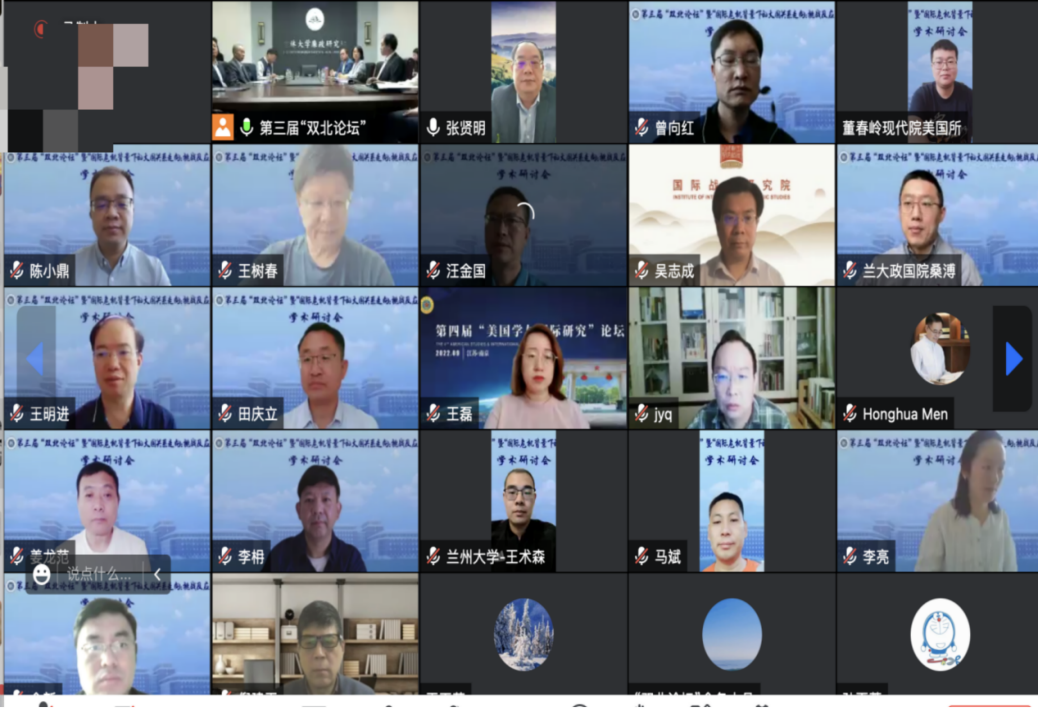
The opening ceremony of the conference was presided over by Professor Yu Haiyang, Vice Dean of the School of Administration of Jilin University, and delivered speeches by Professor Wang Jinguo, Dean of the School of Politics and International Relations of Lanzhou University and Professor Zhang Xianming, Dean of the School of Administration of Jilin University. After the speech, all the delegates took a group photo.
The keynote speech session of the forum was presided over by Zeng Xianghong, Vice Dean of the School of Politics and International Relations of Lanzhou University and professor of the Institute of Central Asian Studies of Lanzhou University. Professor Wu Zhicheng, Deputy Dean of the Institute of International Strategy of the Party School of the CPC Central Committee (Chinese Academy of Governance), Professor Men Honghua, Dean of the School of Politics and International Relations of Tongji University, and Professor Liu Jun, deputy dean of the School of Politics and International Relations of East China Normal University, delivered special speeches respectively, and expressed their unique views on the Russia-Ukraine conflict and China-Russia relations under the century of change.
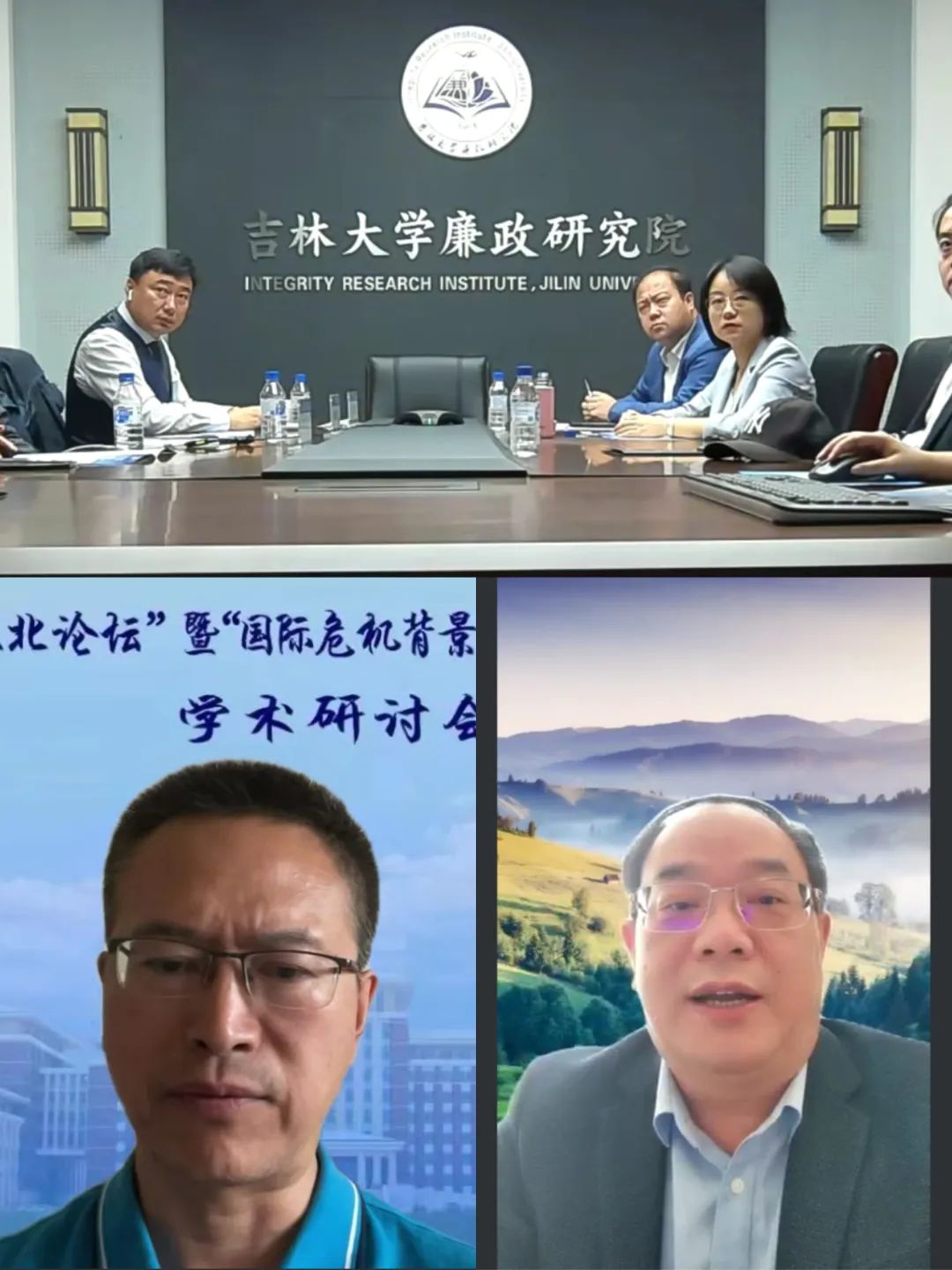
Professor Wu Zhicheng, deputy director of the Institute of National Strategy of the Party School of the CPC Central Committee (National Academy of Governance), pointed out that the Russia-Ukraine conflict has intensified the instability and insecurity in the 100-year period of change, and has an unpredictable impact on the international community; Professor Men Honghua, Dean of the School of Politics and International Relations of Tongji University, with the title of "Coping with a Century of Change, a New Bureau of Operation and Strategy", proposed that under a century of change, China should actively shape a period of strategic opportunities and enrich and improve the national strategic system. Professor Liu Jun, vice Dean of the School of Politics and International Relations of East China Normal University, made an in-depth analysis of how to promote China-Russia relations in the midst of change and chaos.
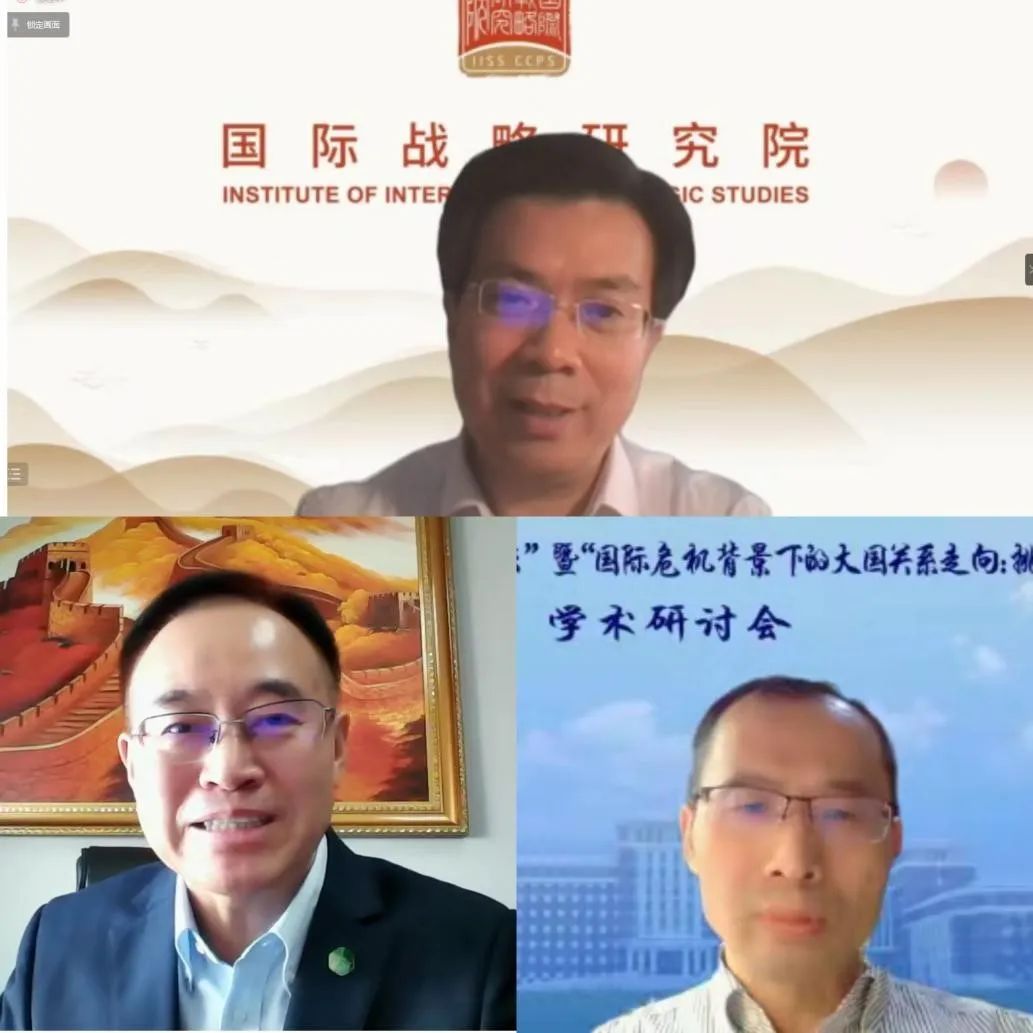
The seminar will have two sub-forums, each of which will be divided into the first and second half with two sub-topics. The topic of the first half of the sub-forum was "Russia-Ukraine conflict and its international effect", moderated by Professor Huang Fengzhi of the School of Administration, Jilin University. Jiao Yiqiang, Professor of the School of Politics and International Relations of Lanzhou University, made a report entitled "The geopolitical impact and impact of the Russia-Ukraine Conflict on Central Asia", which analyzed the geopolitical impact and impact of the Russia-Ukraine conflict on Central Asia from three aspects: politics, economy and security. Wang Mingjin, professor of the School of International Relations of Beijing Foreign Studies University, delivered a report entitled "Progress on the European Security and Defense Agenda", which mainly introduced the evolution of European security and defense policy and the evaluation of European defense policy. Wang Shuchun, professor of the School of International Relations at Guangdong University of Foreign Studies, delivered a report entitled "The Impact of the Russia-Ukraine Conflict on China-Russia Arctic Cooperation", and made an in-depth elaboration on the challenges and opportunities of China-Russia cooperation in Arctic development. Ma Bin, an associate research fellow at Fudan University's Institute of International Studies, delivered a speech titled "The Return of Geopolitics? The transformation of Russia-EU relations in the context of conflict ". Chen Yiyi, Associate professor of the School of Politics and International Relations of Lanzhou University and the Institute of Central Asian Studies of Lanzhou University, delivered a report entitled "The Change of Relations between Major Powers and the Implementation and Effects of UN Peacekeeping Operations". Wang Shusen, lecturer of the School of Politics and International Relations of Lanzhou University and the Institute of Central Asian Studies of Lanzhou University, gave a speech entitled "Some reflections on the economic impact of the Russia-Ukraine conflict on the Central Asian countries", which focused on the content and impact of Western sanctions on Russia after the conflict of Russia and Ukraine, and evaluated the impact of the Russia-Ukraine conflict on the economy of Central Asian countries from a multi-dimensional perspective. The second half of the sub-forum was "New Trends in major-country relations", moderated by Professor Guo Rui, School of Administration, Jilin University. Professor Ni Jianping, Northeast Asia International Development and Cooperation Research Center, Dalian University of Technology, delivered a report entitled "New Trends in US-Japan Export control to China and their impact on China". Chen State, a young researcher at the School of Politics and International Relations of Lanzhou University and the Institute of Central Asian Studies of Lanzhou University, gave a speech entitled "The Motivation and impact of the Biden Administration's Intensifying ideological competition with China", which analyzed the possible influence of ideology on the direction of Sino-US relations from various aspects. Dong Chunling, professor of the School of International Relations of the University of International Business and Economics and deputy director of the Office of the Research Center for the Overall National Security Concept, made a report entitled "The Reflection and impact of the US strategic community's China Policy under the 'Triple Crisis'". Jin Xin, associate professor of the Asia-Europe Research Center of Xi 'an Jiaotong University, gave a speech entitled "Biden Administration's overseas infrastructure competition against China and China's countermeasures", which mainly analyzed the basic strategies and constraints of the Biden administration's overseas infrastructure competition against China, as well as the comparison of overseas infrastructure strategies between China and the United States under the United States' competition against China, and China's countermeasures under the United States' overseas infrastructure competition against China. Li Yibin, associate professor of the School of Politics and International Relations of Lanzhou University and the Institute of Central Asian Studies of Lanzhou University, gave a report entitled "Research on the Construction of the Asia-Pacific Intelligence Alliance of the United States". Xu Ning, a lecturer at the School of Administration of Jilin University, gave a speech entitled "The historical interpretation and contemporary Dilemma of Sovereignty Practice".
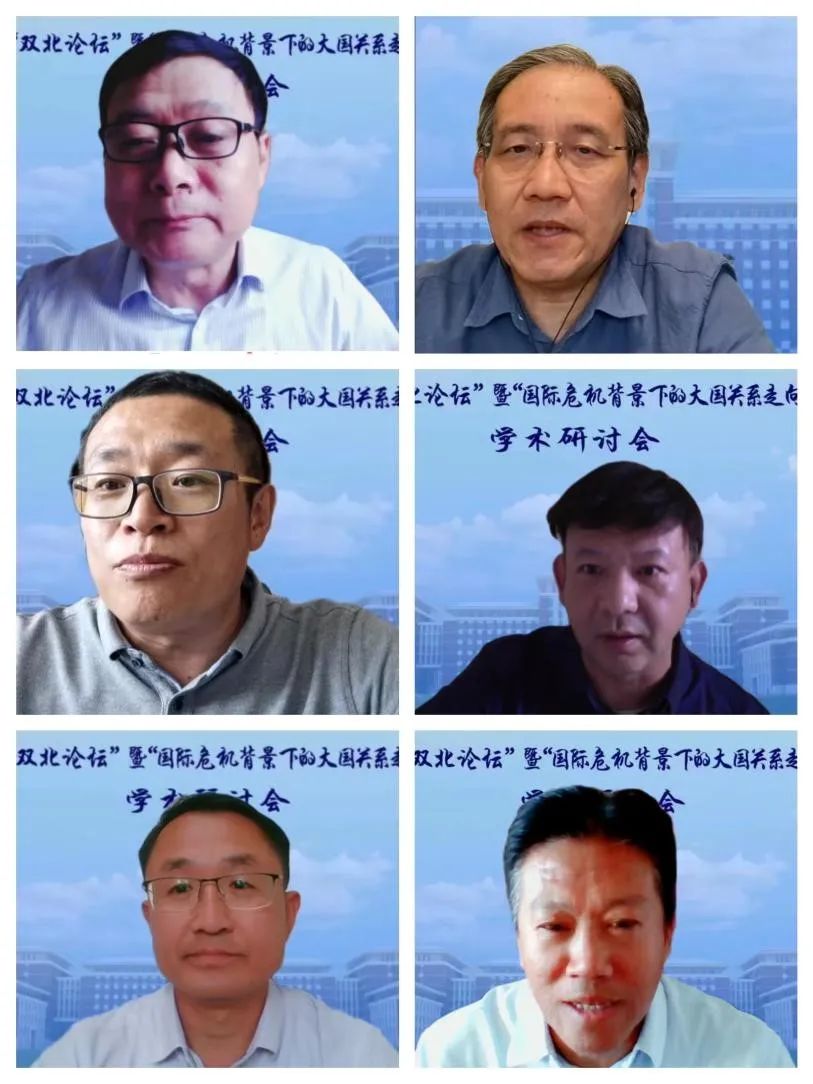
The first half of the second sub-forum, "The Situation in Northeast Asia and China's Diplomacy", was moderated by Professor Chen Xiaoding, Vice Dean of the School of Politics and International Relations of Lanzhou University. Professor Jiang Longfan, Dean of the Institute of National and Regional Studies of Tianjin Foreign Studies University, spoke about China-North Korea relations and the basic policies that China should adopt towards North Korea from a unique perspective. Sun Zhenhai, executive deputy editor of International Outlook Magazine of Shanghai Institute for International Studies, analyzed how to make progress in the complex Sino-Japanese relations, and analyzed the recessive factors behind the explicit; Professor Bi Yingda, deputy Dean of Northeast Asia College of Shandong University, analyzed the Sino-Korean relations under the strategic containment of the United States against China, the structure of Sino-American relations and the turning point of Sino-Korean relations; Li 枏, Deputy Director of the Strategy Office of the Institute of American Studies, Chinese Academy of Social Sciences, briefly analyzed the trilateral relations between the United States, Japan and South Korea under the new international and regional environment; Tian Qingli, Executive Director of the Institute of National and Regional Studies, Tianjin Foreign Studies University, reviewed and summarized the evolution and typical characteristics of China-Japan diplomatic relations in the past 50 years. Professor Wang Sheng, School of Administration, Jilin University, put forward his own views and views on the challenges faced by China-South Korea relations under the background of Great power game and countermeasures. In the second half of session 2, "Geopolitics and Security Governance" was hosted by Meng Xiangchen, assistant researcher of the editorial Department of Northeast Asia Forum of Jilin University. Professor Chen Xiaoding, vice dean of the School of Politics and International Relations of Lanzhou University, explained the manifestation, influence and trend of world political polarization, and analyzed the current situation of serious shrinking of international space, value confrontation and unprecedented competition for international discourse power. Professor Wang Lei of Beijing International Studies University, entitled "Crisis Narrative and Story Frame in Great Power Game", proposed the idea of using stories from different fields as the framework to tell great power discourse. Wei Jinshen, associate professor of the School of Politics and International Relations of Lanzhou University and the Institute of Central Asian Studies of Lanzhou University, analyzed the reasons for the rise of the issue alliance in Central Asia and the adjustment of the Central Asian strategies of the United States, Russia and Japan with the framework of the issue alliance. Li Liang, professor of the School of Politics and International Relations of Lanzhou University and the Institute of Central Asian Studies of Lanzhou University, analyzed India's position on the Russian-Ukrainian war and India's diplomatic characteristics. Professor Sang Pu, from the School of Politics and International Relations of Lanzhou University, analyzed the possible trends of legal competition and global food security governance opened by food system transformation from the perspectives of process, social purpose and effectiveness. Wang Yan, a teacher from the School of Administration of Jilin University, analyzed the strategic choices of Southeast Asian countries under the competitive situation of great powers from a historical perspective, and expounded the historical relations and future prospects between China and Southeast Asian countries.
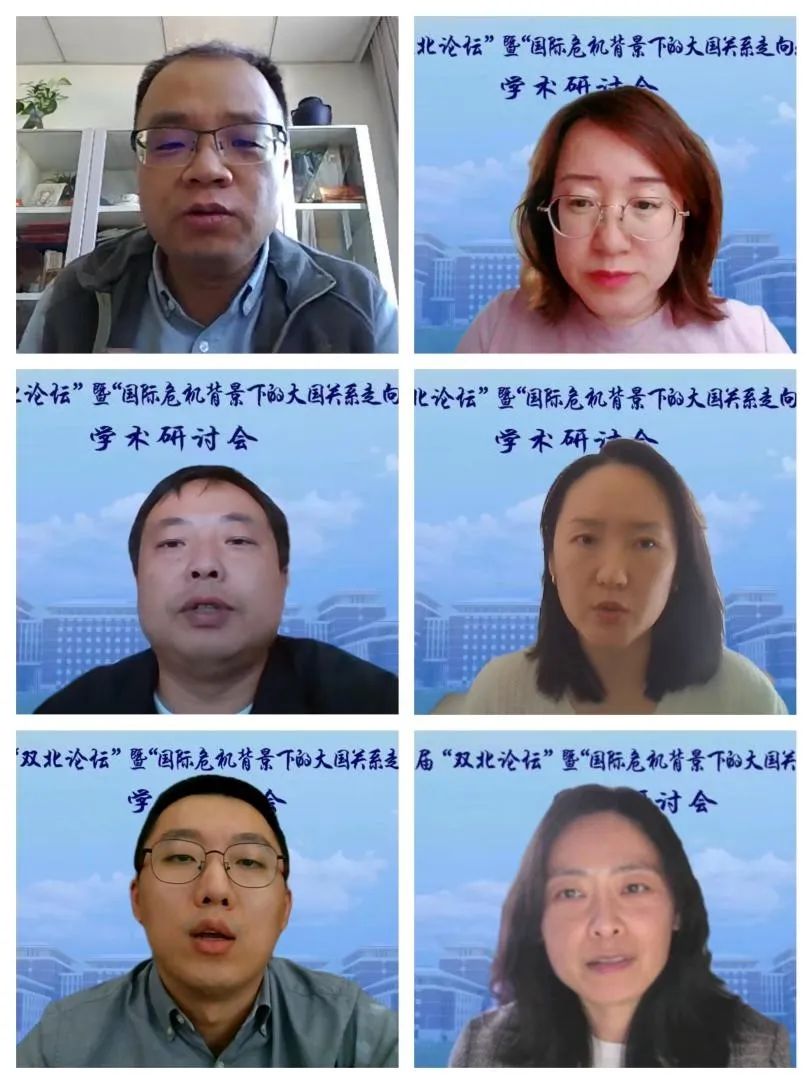
Finally, the meeting was summarized by Meng Xiangchen, assistant researcher of the editorial department of Northeast Asia Forum of Jilin University. The successful holding of the third "Sino-North Forum" provided a platform for many experts and scholars to carry out academic exchanges on their own research fields and the current practical issues facing the international community. The forum conducted in-depth discussions on major topics such as the Russia-Ukraine conflict, major-country relations and China's diplomacy, and the participants also reached a certain consensus on the direction of major-country relations in the context of international crises. At this point, the seminar successfully concluded.
